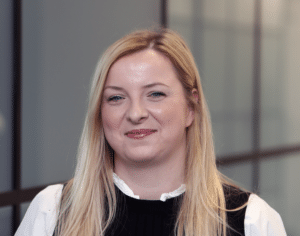Covid has left a tranche of graduates and other recruits without the soft skills so necessary to build relationships with clients. Bridging that skills gap is key to enhancing finance clients’ satisfaction. Kelly Eyton-Jones, culture and recruitment manager at Equilibrium Financial Planning, looks at ways to help give new recruits the skills they need.
When seeking new recruits, it is often the case that financial planning firms will look for candidates with a solid understanding of financial concepts, products, and regulations. Of course, technical competence is crucial to become a successful paraplanner, but equally as important are the soft skills required to connect with clients, understand their needs, and provide a memorable experience.
Recognising their significance, 2023 research by the Financial Services Skills Commission revealed that the demand for behaviours has outpaced technical skills, with 63% of members stating they require more empathetic employees – the largest increase in demand amongst all attributes.
Along with an empathic nature, employees that hold soft skills such as effective communication, adaptability, and resilience have the potential to greatly impact clients’ satisfaction, and therefore, the overall success of the financial planning firm.
The Covid generation
Despite their importance, securing graduates with the mandatory soft skills has been a significant challenge within the finance industry since the Covid-19 pandemic. Deemed ‘the Covid generation’, these students were forced to substitute in-person lessons and social events for remote working and tech-focused communication. From collaborating on group projects, learning to navigate setbacks, and being exposed to diverse perspectives and learning styles, students missed out on building the key soft skills that university provides.
Indeed, whilst 29% of finance firms reported an increase in the supply of employees who are considered both adaptable and empathetic, the demand for each skill is now substantially higher, with 67% and 63% respectively, still seeking staff with these skills.
Affected students have also discussed the impact of pandemic-induced isolation. Research by Gartner found that 46% believe the pandemic made pursuing their educational or career goals more difficult, and over half (51%) feel that their education has not prepared them to enter the workforce. As paraplanners often have a key opportunity to make a lasting impression, graduates’ lack of confidence is concerning.
Bridging the skills gap
Seeking a swift resolution, some companies may be tempted to bridge the internal skills gap by seeking employees that haven’t been impacted by Covid-19. However, this often isn’t the most beneficial outcome for either party. Between reputation and prestige, opportunities for impact and responsibility, and technology and resources, a growing range of factors are now influencing graduates’ employment decisions, making the hunt for top talent a competitive undertaking.
Also, 260,000 highly skilled people are expected to leave the finance sector when current professionals begin to retire or change career. Therefore, it is essential that financial planning firms don’t solely rely on the expertise of experienced employees and have the foresight to invest in graduates’ potential ahead of changing market demands.
Skills forecasting can be incredibly helpful to determine how the needs of the firm might adapt over the years, yet the number of firms looking ahead to the next three years decreased from 28% to 17% last year. By preparing graduates – and future employees – for the evolving demands of the labour market, organisations can ensure they have the talent they need to remain competitive in a rapidly changing industry.
To minimise this challenge, below are some tips for financial planning firms to reduce Covid-induced skills gaps and prepare their workforce for future requirements.
Apply a blended learning approach
Classroom learning forms an essential part of the graduate learning journey. For paraplanners, it provides them with a strong foundation of financial knowledge and procedures to utilise and revisit throughout their career. Although, for graduates that haven’t been exposed to the realities of practical work settings, classroom learning isn’t enough to produce the adaptability and resilience that is usually built in these environments.
A blended learning approach that combines both methods can be incredibly valuable to help graduates respond effectively to emerging challenges – a pertinent undertaking within the evolving financial landscape. By immersing graduates in the day-to-day role of a paraplanner with on-the-job training, financial planning firms can build new recruits’ ability to navigate uncertainties and respond effectively to obstacles.
Mentorship
In practice, this could include pairing graduate paraplanners with experienced employees for shadowing and mentoring opportunities. This allows them to observe how tasks are performed, ask questions, and learn from real-life scenarios – knowledge that can be absorbed and applied throughout their interactions with clients. Along with advancing their skill development, having the support and encouragement of a consistent mentor can accelerate graduates’ confidence and progression within the company. Workshops led by senior figures within the business also offer graduates a chance to enhance their knowledge and showcase their skill development.
Strengthen client relationships
With ongoing economic volatility and uncertainty comes the likelihood of clients becoming more cautious about their financial decisions. Looking to gain increased security, they may seek to appoint firms with an established track record of stability and risk management expertise, as well as leaning on testimonials from trusted sources. The current economic constraints also encourage an increased focus on fee transparency and the value they receive in exchange for those fees, meaning clients may be swayed by firms that offer competitive rates and clearly articulate the value proposition of their services.
With so many potential factors influencing clients’ perception of their chosen firm, relationship building is a critical exercise for paraplanners. Strong relationships facilitate open and effective communication that instils a sense of trust in the advice and recommendations offered, building client loyalty which, in turn, encourages higher retention rates. Paraplanners that build a rapport with clients – such as demonstrating an understanding of, and empathy towards, their financial goals or providing reassurance during challenging times – can significantly influence clients’ satisfaction with their financial planning firm.
Reversing the trend
Ultimately, graduates can’t build strong client relationships unless they possess an arsenal of soft skills – an empathetic nature, self-direction, adaptability, and resilience included. Simply put, without an ability to build lasting relationships, clients are likely to feel undervalued and dissatisfied with the service provided.
Whilst the impact of absent soft skills throughout the Covid-generation is clear across the financial industry, that doesn’t mean it is too late to reverse the trend. With proper training, exposure to missed opportunities, and realising the possibilities created by bridging the skills gap, pandemic-educated paraplanners can play a critical role in connecting with clients and influencing the firm’s success for years to come.
This is intended as an informative piece and should not be construed as advice.
The inclusion of any app names is solely for informational purposes and does not constitute an endorsement or recommendation by Equilibrium. Users are encouraged to conduct their own research and exercise discretion when selecting and using apps.































